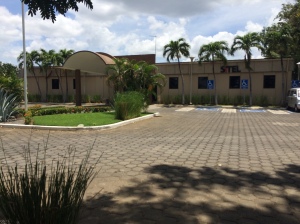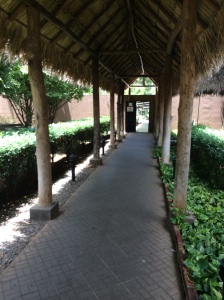While we have all heard of outsourcing, especially for customer service industries or manufacturing of many companies we all use, the discussion here in Nicaragua about call centers is very different of that in the United States. In the United States, the common themes are that outsourcing is bad, they should be hiring people from the United States etc. Here in Nicaragua, call centers are a source of employment, income, and dream jobs. We have heard from many of our English students that their dream job would be to work at a call center. In addition, we use this landmark as the directions to our house and the center. With all this discussion of the call center, we felt we had to learn more!
As we have met many of our neighbors, one neighbor known by customers as “Donald”, was walking past our house. After chatting with him on the porch, we learned he works in a call center. We expressed our interest to see the center, so he invited us to lunch at their cafeteria. While we were not able to enter the call center floor, we were able to see the environment and learn quite a bit!
The old United States’ Embassy, located only a few blocks away from the center, is now home to Sitel. According to Sitel’s website, Sitel “serves 62 countries, whilst sharing one common passion- to make every customer experience memorable”. The Sitel call center in Managua is the home of Capital One, Cricket, and Money Works’ customer services lines.
So what does that experience look like for the young adults of Managua working in these call centers? While many people do not like the job, and many people quit everyday, the young people of Managua all want these jobs. Why is that? Working in a call center pays about $500 a month, which for Nicaragua is a very high salary. With this high of a salary, many call center employees are able to save for school or help their families. Employees work 24/7 365 days a year, no matter if it is a Nicaraguan holiday or an American holiday; however, they are paid extra on Nicaraguan holidays. Most employees get two days off a week, but the center is always running! To work in a call center, there is an extensive English interviewing process, followed by a month long training program.
The majority of the employees are Nicaraguan, except higher up officials. Our neighbor estimated that of the 2,000 employees almost 75% are between the ages of 20 and 35. Call centers provide an opportunity for English speaking Nicaraguans, both who grew up here or who have been deported from the United States, a high paying job. The unfortunate reality is that there are not other alternatives in the Managuan job market, especially since many people work in the informal sector.
Call centers continue to be a growing and appealing industry here in Nicaragua. Which makes me wonder, where are the customer service lines I call most located? And more importantly, what will happen to this growing middle class if the companies decide to move?
Paz,
Natasha
Pictures taken at the Sitel Call Center, better known as the old US Embassy
Sources:



Have loved your first posts! Looking forward to meeting both of you at some point. This is such an interesting post – I never got to know that much about Sitel while living there, but the dynamic is so fascinating.
Thanks for your comment! I am hoping to learn more about all the call centers!
Thank you so much for this great information and insight!! Love hearing what is is like on the ground. Since the turn over is so high, why to folks leave?
Many people quit because the working conditions are not great. People have said its a good job if you are in school, but working at night or weekends is not ideal for many people despite the high wages!